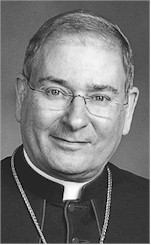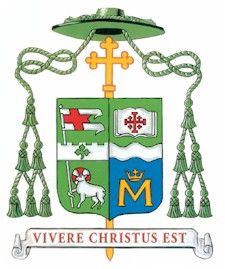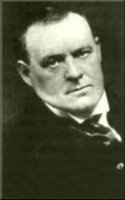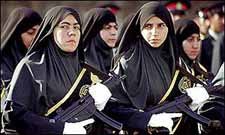The first video below is of the Archbishop's funeral and the second is the funeral of Father Ragheed Ghanni, murdered last year at the same church in Mosul, Holy Spirit. Father Ghanni wasthe Archbishop's secretary. The singing on the video is a hymn to Our Most Blessed Mother and the Mother of Christ, the Theotokos, the God-bearer and Mother of God; it is sung by the same Father Ghanni. Archbishop Rahho can be seen celebrating the funeral rite. The people of Iraq have sufferred much. The Catholics in Iraq of the Chaldean Rite are the oldest indigenous Christian community in the world. They suffer along with the Catholics in Palestine at the hands of the Islamo-Fascists. Where has the outcry been in the west about this abhorrent event? Why has it not been promulgated in the secular media?Mosul (AsiaNews) - The Chaldean archbishop of Mosul is dead.
Archbishop Faraj Rahho was kidnapped last February 29 after the Stations of the Cross. His kidnappers gave word of his death, indicating to the mediators where they could recover the body of the 67-year-old prelate. "It is a heavy Cross for our Church, ahead of Easter", the Bishop Rabban of Arbil tells AsiaNews in response to the news. Leaders of the Chaldean Church, including Bishop Shlemon Warduni, brought the body to the hospital in Mosul to ascertain the causes, still unknown, of the archbishop's death. The funeral will be held tomorrow in the nearby city of Karamles. Archbishop Rahho will be buried near Fr Ragheed, his priest and secretary killed by a terrorist brigade on June 3, 2007, while leaving the church after celebrating Mass.
The archbishop had been very sick. He had suffered a heart attack a few years ago, and since then he had needed to take medication every day. The difficult negotiations for his release carried forward over the past 14 days of his kidnapping had immediately raised concern because of the total absence of direct contact with the hostage. The conditions posed by the kidnappers - sources in Mosul tell AsiaNews - in addition to an outrageous ransom on the order of millions of dollars, had also included the provision of weapons and the liberation of Arab prisoners held in Kurdish prisons.The news of Archbishop Rahho's death "profoundly wounds and saddens" the pope, says the director of the Vatican press office, Fr Federico Lombardi. Benedict XVI hopes that "this tragic event may renew once again and with greater force the efforts of all, and in particular of the international community, for the pacification of this greatly tormented country". Three times in recent days, the pope had launched an appeal for the liberation of the bishop. Numerous Muslim leaders had also spoken out for the release of the archbishop, both Sunnis and Shiites, in Iraq, Lebanon, and Jordan, and also condemned the action as "contrary to Islam".
Kyrie eleison, Christe eleision, Kyrie eleison.
When will we all learn?
How long, O LORD?
Tarry not LORD Jesus Christ.
Salvator Mundi, come and rescue your people!
At this time let us turn to God to pray for an end to the suffering of our Catholic brethren. May we also learn by their own faithful suffering how to bear the tribulation that will soon come our way.
Let us pray that these two new martyrs will intercede for us to the Father.











